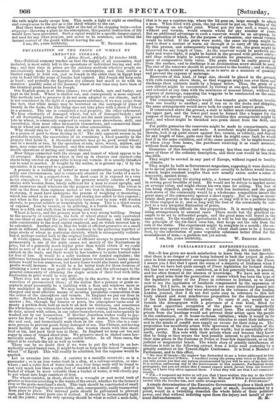IRISH PARLIAMENTARY REPRESENTATION.
_Dublin, 6th October 1863. San—It has given me much satisfaction to learn from the last Spectator that there is no danger of your being induced to back the project in refer- ence to Irish representative arrangements lately put forward by the Times. I assure you I feel that I speak the sense of a majority of Irishmen when I say, that we have had quite enough of Times legislation for Ireland during the last ten or twenty years ; conceived, as it has generally been, in passion, and too often framed in the absence of knowledge. We have not seen so much good arise from the persecution of classes which has been the type of the legislative policy of the Times in reference to Ireland, as to desire now to see the oppression of landlords compensated by the oppression of priests. Yet I have, in my time, known too many absurdities passed into law for Ireland because they were advocated in the columns of the leading London journal, that I do not feel quite easy in reference to this last truly absurd and most mischievous proposition for the disfranchisement of the Irish Roman Catholic priests. To carry it out, would be to furnish the demagogues with a grievance of a real kind, fitted for the most opportune occupation of the place now very imperfectly filled by shadowy recollections of the penal laws. The exclusion of the priests from the hustings would not prevent their action upon the people in the confessional, or in house-to-house visitation ; while it would in its offensive operation give them an additional stimulus to exert their influence, and in the minds of candid men supply an excuse for their doing so. The proposition has manifestly arisen from ignorance of the true nature of the priests' power. It has no basis in the other world; but is essentially of the earth, earthy. Men vote with their priests when and because they know that by doing so they secure the best possible interest to get themselves or their sons places in the Customs or Police or Poor-law department, or on the judicial or magisterial bench. The whole story of priestly interference at elections is told in the following extract from a letter read yesterday by a priestly assistant at the Tenant-Right Conference. It is from a Member of Parliament, and to this effect.
" My dear M•Quade—My nephew has forwarded to me a letter addressed to him In favour of Michael O'Brien. I recollect seeing the young man when at Ennis, and can only assure you that any person recommended byyou will be sure of my Interest. It is useless addressing any of the Government at this moment, Parliament being prorogued; but you are aware that I cannot expect much favour from the Govern- ment, as I have very often opposed them. I trust they will see that I act conscien- tiously. " P.8.—I reopened my letter to tell you that I have written this day to the Chief Secretary, requesting that he will appoint Mr. Michael O'Brien to a situation con-
nected with the Income-tax, now under arrangement. I. Frrzoxnar.n."
A simple determination of the Executive Government to place a black mark against the name of any placehunter, great or small, recommended by a priest, would in a twinkling demolish the whole fabric of their political power, and that without inflicting upon them the injury and insult of per-


























 Previous page
Previous page